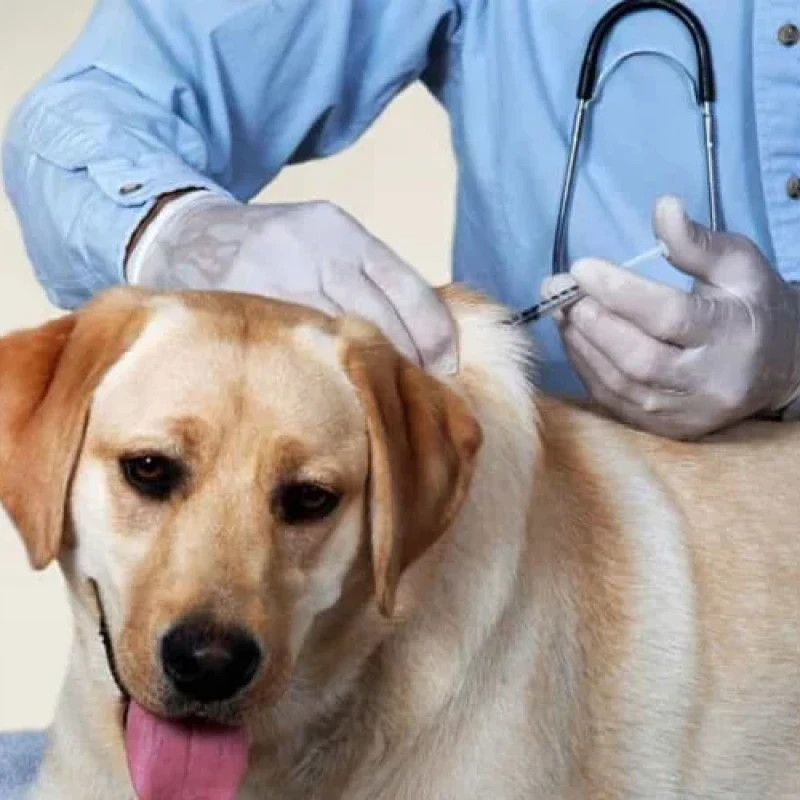Caring for newborn puppies and the mother after birth requires patience and knowledge of nutritional and health needs. This article from Pet Mart will provide you with scientific information and proper techniques for caring for puppies, ensuring that both the mother and puppies stay healthy and happy

Caring for newborn puppies, whether with or without a mother, requires an understanding of their needs and proper care methods to help you avoid many difficulties and challenges. If you're caring for a litter of newborn puppies, refer to this article for essential knowledge and skills, from choosing nutritious food to creating an ideal living environment.
Initial Care for the Mother and Newborn Puppies
Below is a general guide outlining key measures necessary to ensure the best health for both the mother and newborn puppies:
- Initial Care: After giving birth, it's crucial to clean the mother dog with warm water and a cloth, avoiding soap or disinfectants unless instructed by a vet.
- Physical Check-up: Thoroughly check both the mother and puppies to ensure no signs of abnormalities like bleeding, foul-smelling discharge, or other issues.
- Nutrition and Health: Regularly check the puppies to ensure they are nursing sufficiently and are in good health. The mother should also be checked to prevent conditions like mastitis or other health problems.
- Veterinary Visit: Both the mother and puppies should be examined by a vet within 48 hours after birth to ensure their health and to catch any potential issues early.
- Mother's Milk Supply: If there are signs that the puppies are not getting enough milk, consult a vet. You may need supplemental feeding and guidance on preparation and portion sizes.
- Eclampsia and Milk Fever: If signs of eclampsia appear, contact a vet immediately. This is a medical emergency that could threaten the mother’s life if not treated promptly.
Cautiously Approaching Newborn Puppies
Caring for newborn puppies requires caution and patience, especially during the first few weeks of their lives. Both the mother and puppies need peace and minimal disturbance to develop safely and healthily. Here are some guidelines for careful and proper care:
- Approach with Care: During the first two weeks, minimal interference is best. Puppies are highly susceptible to illness, and too much handling may stress the mother. Approach the puppies gently and avoid disturbing them unless necessary, especially if the mother appears stressed or protective.
- Respect Privacy: The mother may become aggressive if she feels her puppies are threatened. Respect her space and only interact with the puppies when the mother seems calm and comfortable. This helps reduce stress for the mother and creates a safer environment for the puppies.
- Allow Quiet Time: As the puppies grow and become more active, the mother may need additional time to rest. Provide a quiet space for both the mother and puppies, but also check regularly to ensure they remain healthy and safe.
- Socializing and Activities: As the puppies grow and explore their surroundings, help them safely discover their new environment. Light socialization with family members and gentle exercise will support their overall development into healthy, happy adult dogs.
Feeding Newborn Puppies with Mother's Milk
During the first few weeks of life, newborn puppies rely entirely on their mother's milk, a crucial source of nutrition that helps them grow and provides immunity against diseases. Early and frequent feeding, particularly the nutrient-rich colostrum, is vital for protecting the puppies from infections and keeping them strong and healthy. If the mother cannot care for the puppies, you may need to intervene by helping them nurse from the mother or provide alternative feeding because:
- Maternal Immunity from Mother's Milk: In the first few days after birth, the mother’s milk provides essential antibodies to help puppies fight off bacteria and viruses. Colostrum is rich in nutrients that support their growth. Mother’s milk not only offers the necessary nutrition but also contains antibodies to prevent illness. The amount of immunoglobulins (antibodies) in the mother’s milk reflects the level of protection she can pass to her puppies, boosting their natural immune system.
- Supplementing with Puppy Formula: If the mother is unavailable or unable to nurse, consult a vet about suitable puppy milk substitutes. Avoid using human milk and ensure that you know how to properly bottle-feed the puppies for safe and effective feeding.
- Puppy Development: Understanding the developmental stages of puppies, from opening their eyes to teething, is important for providing proper care and ensuring their health.
- Antibody Testing: Testing for antibody levels in the blood can help determine how well the mother is protecting her puppies through her milk. Mothers with high antibody levels offer stronger protection against dangerous diseases like canine distemper and parvovirus.
Environment and Temperature for Newborn Puppies
Caring for newborn puppies is a significant responsibility that requires a deep understanding of their living environment, temperature, and nutrition. Puppies grow rapidly in the first few weeks of life, and providing a warm, clean, and quiet environment is crucial.
- Living Environment: Puppies need a clean and safe space to grow. A well-ventilated and clean whelping area in summer, and a warm one in winter, will help protect the mother and puppies from illness. Soft blankets are ideal for lining the whelping box, keeping the puppies warm and comfortable. Natural light is also important to prevent rickets and promote healthy development in newborn puppies.
- Stable Temperature: Maintaining warmth is critical for puppies to regulate their body temperature and grow healthily. Puppies are unable to regulate their own body temperature until they are 3-4 weeks old. Using heat lamps and maintaining a stable temperature in the whelping box, gradually reducing it over time, will help puppies adjust to their new environment.
When do puppies open their eyes?
Many people wonder why newborn puppies do not open their eyes right away. This is entirely normal and can be attributed to several factors:
- Time in the mother's womb: Puppies only develop in their mother's womb for a short period, so they are not fully developed enough to open their eyes immediately after birth.
- Brain development: Like all mammals, puppies go through specific stages of brain development while being nurtured by their mother's milk. Their eyes open once their brain reaches a certain stage of maturity, which is closely linked to the development of their nervous system.
- Physical growth: Each species of mammal has its own timeline for achieving independence and separating from the mother, based on the basic and necessary physical development.
Disease prevention when caring for newborn puppies
This is a sensitive stage for puppies. As they grow and start eating regular food, the antibody levels they receive from their mother’s milk begin to decrease. To protect them from illnesses, vaccinations are essential. However, vaccinating too early may result in resistance from the mother's antibodies, reducing the vaccine's effectiveness. This period requires special care and patience in raising newborn puppies.
- Vaccination is the best solution: Vaccinations are the most effective way to protect puppies from diseases. New vaccines are being researched and developed, offering hope for better care during the early stages of life.
- Preventing digestive disorders: Puppies can experience digestive issues if they ingest harmful substances from the mother. To prevent this:
- Keep the mother clean, especially after giving birth (cleaning every two hours is ideal).
- Provide digestive enzymes for the puppies.
- Monitor the puppies and prevent them from licking each other's genitals and anus.
- Ensure the puppies are nursing from a clean, infection-free mother.
- Respiratory issues prevention: Puppies are also susceptible to respiratory problems. To prevent this:
- Regularly clean the mother.
- Keep the living environment clean and well-ventilated.
- Change the bedding frequently (every 1-3 hours), as puppies urinate often.
- Monitor the puppies and ensure they are not exposed to disease-causing factors.
- If one puppy experiences diarrhea or pneumonia, the infection can quickly spread to the others.
- Sudden death syndrome in newborn puppies: Sudden death in puppies is a serious issue and can be caused by:
- Cold or heat stress that disrupts their ability to regulate body temperature.
- Sudden hypoglycemia due to hunger.
- Overeating, causing milk to enter the airways.
- Suffocation caused by the mother accidentally blocking their noses.
- Congenital heart problems.
Weaning and transitioning puppies to solid food
Puppies should increase their weight by about 10% daily, though this varies by breed and size. The weaning process, where newborn puppies transition from their mother’s milk to solid food, is a critical phase that requires special care. By following the right feeding schedule and understanding their needs, you will ensure they grow strong and healthy. Always prioritize quality and variety in their diet, and maintain support from the mother’s milk throughout the process.
- Early stage: Exploring new tastes
- Days 1-14: During this stage, the mother’s milk is the sole and most vital source of nutrition. Avoid introducing other foods, as the puppies may reject the milk that contains precious antibodies.
- Days 15-20: Begin introducing fresh goat’s milk, warmed to the puppy's body temperature. This is the first step in getting the puppies accustomed to food other than their mother’s milk.
- Transition phase: From milk to solid food
- Days 20-25: Add rice porridge mixed with ground or minced meat to the puppy’s diet. Ensure that the food is prepared correctly, soft, and easy to digest.
- Days 25-30: Gradually increase the amount of food and reduce the amount of milk. Also, supplement their diet with necessary vitamins and minerals such as calcium chloride to ensure healthy growth.
- Development stage: Introducing more variety
- Day 30 onward: Diversify the diet with potatoes, green vegetables, and more meat. Add vitamins A, D, and other minerals to support the puppies' overall development.
- Under 120 days old: Ensure the puppies eat five meals a day. From 4-6 months, reduce this to four meals, and after six months, feed them 2-3 meals a day.
Caring for newborn puppies requires patience, love, and an understanding of their special needs. From feeding to training, every step in this journey brings joy and challenges. Always seek guidance from veterinary experts to ensure your puppies grow strong and healthy.








